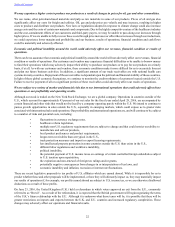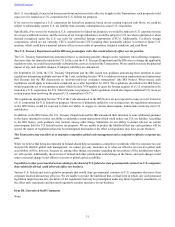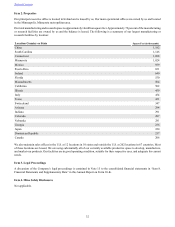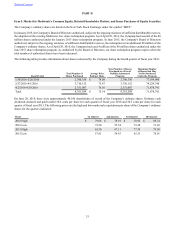Medtronic 2016 Annual Report Download - page 32
Download and view the complete annual report
Please find page 32 of the 2016 Medtronic annual report below. You can navigate through the pages in the report by either clicking on the pages listed below, or by using the keyword search tool below to find specific information within the annual report.
Table of Contents
29
comprehensive plan to create an agreed set of international rules for fighting base erosion and profit shifting. As a result, the tax
laws in the U.S., Ireland and other countries in which we and our affiliates do business could change on a prospective or retroactive
basis, and any such changes could materially adversely affect our business.
Moreover, tax authorities may carefully scrutinize companies that result from a cross-border business combination (such as us),
which may lead such authorities to assert that we owe additional taxes, which could have a material adverse effect on our business,
results of operations, financial condition, and cash flows.
Risks Relating to Our Jurisdiction of Incorporation
Irish law differs from the laws in effect in the U.S. and may afford less protection to holders of our securities.
It may not be possible to enforce court judgments obtained in the U.S. against us in Ireland based on the civil liability provisions
of the U.S. federal or state securities laws. In addition, there is some uncertainty as to whether the courts of Ireland would recognize
or enforce judgments of U.S. courts obtained against us or our directors or officers based on the civil liabilities provisions of the
U.S. federal or state securities laws or hear actions against us or those persons based on those laws. We have been advised that
the U.S. currently does not have a treaty with Ireland providing for the reciprocal recognition and enforcement of judgments in
civil and commercial matters. Therefore, a final judgment for the payment of money rendered by any U.S. federal or state court
based on civil liability, whether or not based solely on U.S. federal or state securities laws, would not automatically be enforceable
in Ireland.
As an Irish company, we are governed by the Irish Companies Acts, which differ in some material respects from laws generally
applicable to U.S. corporations and shareholders, including, among others, differences relating to interested director and officer
transactions and shareholder lawsuits. Likewise, the duties of directors and officers of an Irish company generally are owed to the
company only. Shareholders of Irish companies generally do not have a personal right of action against directors or officers of the
company and may exercise such rights of action on behalf of the company only in limited circumstances. Accordingly, holders of
our securities may have more difficulty protecting their interests than would holders of securities of a corporation incorporated in
a jurisdiction of the U.S.
A transfer of our shares, other than ones effected by means of the transfer of book-entry interests in the Depository Trust
Company, may be subject to Irish stamp duty.
Transfers of our shares effected by means of the transfer of book entry interests in the Depository Trust Company (DTC) will not
be subject to Irish stamp duty. However, if you hold our shares directly rather than beneficially through DTC, any transfer of your
shares could be subject to Irish stamp duty (currently at the rate of 1% of the higher of the price paid or the market value of the
shares acquired). Payment of Irish stamp duty is generally a legal obligation of the transferee. The potential for stamp duty could
adversely affect the price of your shares.
In certain limited circumstances, dividends we pay may be subject to Irish dividend withholding tax and dividends received by
Irish residents and certain other shareholders may be subject to Irish income tax.
In certain limited circumstances, dividend withholding tax (currently at a rate of 20%) may arise in respect of dividends paid on
our shares. A number of exemptions from dividend withholding tax exist such that shareholders resident in the U.S. and other
specified countries may be entitled to exemptions from dividend withholding tax.
Shareholders resident in the U.S. that hold their shares through DTC will not be subject to dividend withholding tax, provided the
addresses of the beneficial owners of such shares in the records of the brokers holding such shares are recorded as being in the
U.S. (and such brokers have further transmitted the relevant information to a qualifying intermediary appointed by us). However,
other shareholders may be subject to dividend withholding tax, which could adversely affect the price of their shares.
Shareholders entitled to an exemption from Irish dividend withholding tax on dividends received from us will not be subject to
Irish income tax in respect of those dividends unless they have some connection with Ireland other than their shareholding in our
Company (for example, they are resident in Ireland). Shareholders who receive dividends subject to Irish dividend withholding
tax will generally have no further liability to Irish income tax on those dividends.
Our shares received by means of a gift or inheritance could be subject to Irish capital acquisitions tax.
Irish capital acquisitions tax (CAT) could apply to a gift or inheritance of our shares irrespective of the place of residence, ordinary
residence or domicile of the parties. This is because our shares will be regarded as property situated in Ireland. The person who
receives the gift or inheritance has primary liability for CAT. Gifts and inheritances passing between spouses are exempt from
CAT. Children have a tax-free threshold which Irish Revenue typically updates annually in respect of taxable gifts or inheritances
received from their parents.
























